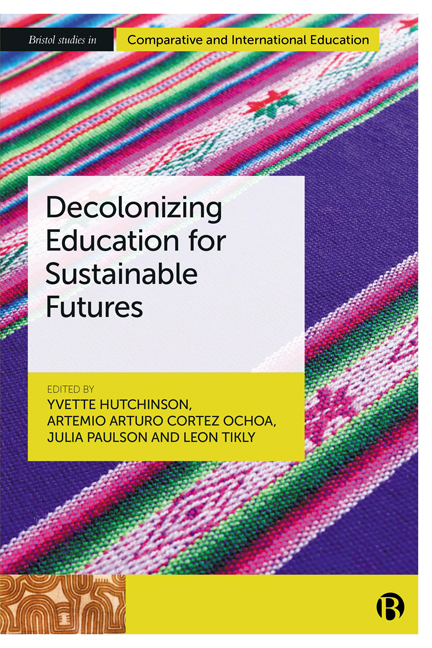Book contents
- Frontmatter
- Contents
- Series Editor Preface
- List of Figures and Table
- List of Abbreviations
- Notes on Contributors
- Acknowledgements
- Introduction
- PART I Connecting Decolonial and Sustainable Futures in Education
- PART II Decolonizing Education for Sustainable Futures: From Theory to Practice
- PART III Education’s Reparative Possibilities: Responsibilities and Reckonings for Sustainable Futures
- Conclusion
- Afterword
- Index
7 - Decolonizing the Curriculum in English Secondary Schools: Lessons from Teacher-led Initiatives in Bristol
Published online by Cambridge University Press: 18 January 2024
- Frontmatter
- Contents
- Series Editor Preface
- List of Figures and Table
- List of Abbreviations
- Notes on Contributors
- Acknowledgements
- Introduction
- PART I Connecting Decolonial and Sustainable Futures in Education
- PART II Decolonizing Education for Sustainable Futures: From Theory to Practice
- PART III Education’s Reparative Possibilities: Responsibilities and Reckonings for Sustainable Futures
- Conclusion
- Afterword
- Index
Summary
Introduction
School teachers in England are in a problematic position with respect to the ‘decolonizing the curriculum’ agenda. On the one hand, they have some scope to determine what they teach in terms of content and methods, and are not prohibited from engaging in such initiatives, as evidenced by the wide-ranging work underway (for example, Moncrieffe, 2020; Gandolfi, 2021; Glowach et al, 2023). On the other hand, England has what we might term an ‘unconducive policy environment’ for this work. The Department for Education does not endorse such initiatives and external accountability measures do not incentivize them. Despite the government's expressed aim to ‘eliminate discrimination [and] advance equality’ in education (DfE, 2014), its reforms to the national curriculum have been widely criticized for ‘nationalistic ideologies, with monocultural and Anglocentric emphases on exclusively British literature and propagandist history’ (Cushing, 2020, p 429). National policy actors have little appetite to acknowledge or address well-documented curricular biases towards the perspectives and contributions of white men (for example, Lais, 2017; Parkin and MacKenzie, 2017; Bain, 2018; Belas and Hopkins, 2019; Watson, 2020; Moncrieffe, 2020; Smith, 2020; Tikly, 2022). Indeed, the government has responded with hostility to calls for a more diverse and representative curriculum. While in post, the influential schools minister Nick Gibb rejected calls to make the teaching of Black history compulsory, arguing: ‘We will not create a more harmonious, tolerant and equal society through promoting a curriculum based on relevance to or representativeness of any one group. … A curriculum based on relevance to pupils is to deny them an introduction to the “best that has been thought and said” ‘ (The Guardian, 2021).
English schools operate in an unconducive environment for the kinds of decolonizing work advocated in this book. Such work is neither forbidden nor encouraged, but it is undermined by enduring legacies of colonial, racial and patriarchal domination. In this context, this chapter highlights the critical role of teacher agency in initiatives to decolonize the curriculum. ‘Agency’ refers to intentional, creative acts that run counter to social norms and expectations, and which may challenge the status quo (Priestley et al, 2015).
- Type
- Chapter
- Information
- Decolonizing Education for Sustainable Futures , pp. 136 - 150Publisher: Bristol University PressPrint publication year: 2023

